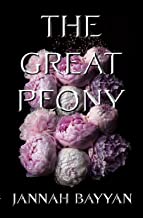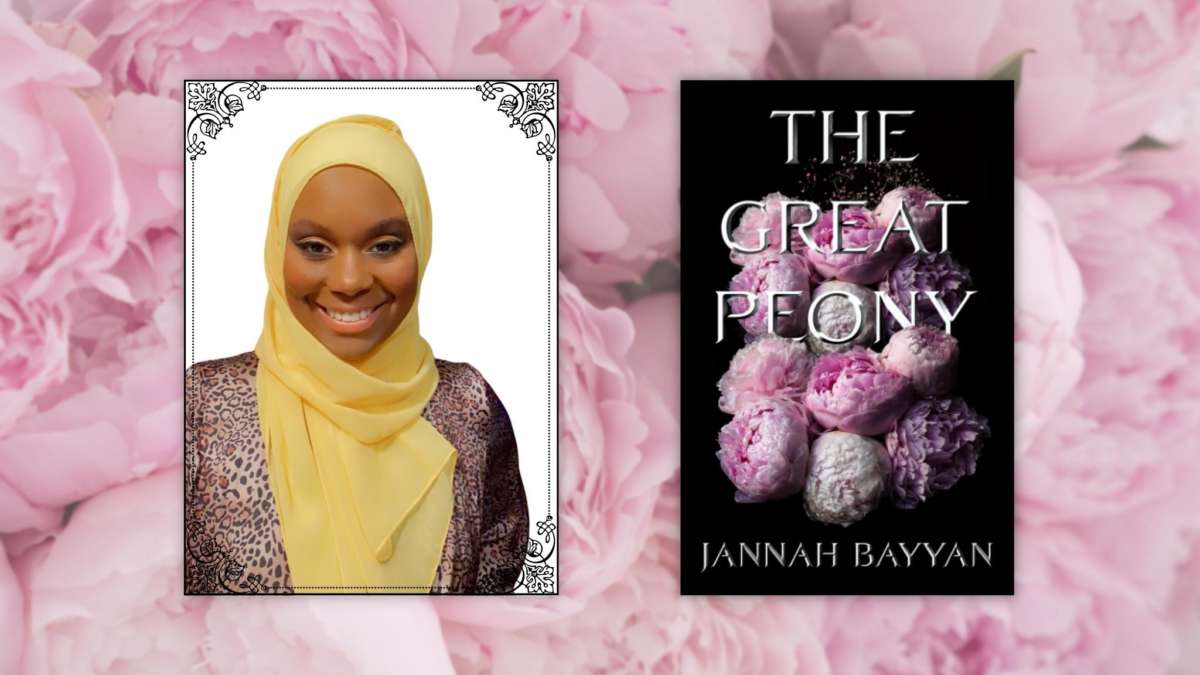The Great Peony by Jannah Bayyan
At once both romance and speculative fiction, Jannah Bayyan’s The Great Peony (Pretty Publications) subverts expectations in a complex discussion about race, class and what it means to partake in the business of marriage. In the novel’s alternate reality, the population is grouped into two distinct factions: the High Society, the affluent upper class who strive to maintain their community’s illustrious bloodlines and dark complexions; and “the unbred,” whose lighter skin marks them as members of the lower class.
Throughout the novel, Bayyan encourages readers to look at the parallels between her immersive world-building and the very real issues our own society is facing. Balancing both the sizzle of a forbidden romance and the complex moral debates that her characters wrestle with, she creates an intricate world of self-discovery and a love that prevails against the challenges in its way.
Check out our full review of The Great Peony here, and keep reading to see what Bayyan had to say about her inspiration for the story and what she hopes readers will take away once they’ve reached the last page.
Q: The Great Peony is set in the future where society is divided by race, class and ideals. What sparked the idea for this high-concept novel?
A: As a Black Woman, I’ve witnessed many conversations surrounding race, class, and ideals and it’s always the same reasoning being brought to the table: systemic and systematic racism, disenfranchisement, the breakdown of the Black family structure and discrimination being the byproducts of our flawed system. The reality of America as we know it, whether we believe it/accept it or not, was founded on a theoretical concept of justice. The world of 3023 in The Great Peony is also founded on a theoretical concept of justice. They converge at the place where self-interests and self-preservation take precedence over the concept of justice for all. The novel provides an insightful mirror into how a society can be based on justice and still create and protect systems of racism, disenfranchisement and discrimination.
Q: Can you explain a little more about your novel as a metaphor for the real world?
A: For one, when people today think of Islam or Muslims they certainly do not envision Black Muslims. And if they do, it’s usually the Nation of Islam which is quite different from traditional Islam. The real world has countless strong and thriving Black Muslim Communities. The question of what if? What if a world existed where faith, the social constructs left by colonialism, and intelligence all contributed to a fully flourished society.
Q: Each character in the novel has a strong personality and stance on their world. Do you see some of yourself in any of these characters?
A: I think all of the characters share parts of me and then on the flipside of that, they are all products of my ideal self image that doesn’t quite exist. For example, Bash’s raw honesty is an ideal trait but it’s something that I had to grow through because how it manifested in me was sarcasm. Sarcasm is a compilation of anger and the inability to say what a person truly needs to say in a given moment. So at 16, I would’ve used that adjective to describe myself but today I wouldn’t even dare. The same with Safina. Her outstanding quality is how brave she is and I’ve always thought of myself as such as well. And that coupled with her penchant for planning, I realized that my own ‘bravery’ was more my naivety which made me impulsive and so I failed at truly planning like her.
Q: The Islam faith plays a large role in the foundations of the novel’s society. What role does religion play in your life or in your writing process?
A: I was born Muslim and chose to practice it in a traditional sense at about 25 years old. I think the statement that best illustrates my thoughts on how religion factors into my writing process is this: At the core of it all, I want the world to ask about me: who was she, not what kind of Muslim was she? Let the focus be on my individual talents and allow whatever elements of my faith and culture to shine through unapologetically without making it the driving force. The novel was not written to sell Islam to anyone but if it enlightens or educates you, then that’s from your openness to receive and I hope everyone gets something different yet meaningful from the series.
Q: What is something you hope that readers take away from The Great Peony?
A: My biggest hope is that whoever reads it can see themselves and identify with the characters. Ultimately, I want the flaws and messiness of each of the characters’ traits to teach humanity the lesson that none of us are perfect and that’s okay but we should still endeavor to kindness and self-improvement.
Q: What plans do you have for the rest of the series? Will Safina Cameron return, or will the sequel focus on a different character’s storyline?
A: The sequel will focus on a different character in the next book. Im a hopeless romantic and much like Disney movies, I’m good with, “and they lived happily ever after.” Sequels to love stories usually take away the glitz of the romance and shows the reality of it and that’s not something I’m interested in doing. Except for twilight, which strung us along until we finally got what we wanted. Although, the next book does provide a glimpse into Safina and Malcolm’s life, the focus is on the tension between Nimat’s internal thoughts and external actions. And we learn about her and it’s really stretching me as a writer to write from her perspective.
About Jannah Bayyan:
Jannah Bayyan is a youthful fun-loving mother of six, an English teacher and a serial entrepreneur. As an author, she has published a self-help book related to unconventional relationships entitled “The Real Talk,” two children’s books: “My Brown Face is Beautiful” and “Goodnight Knight: The Silent Letter Bedtime Book,” and a magazine series entitled “The Pretty Life Uf Motherhood.” She is also the founder of The Garden Foundation of Delaware which serves to empower single-mother households with access to resources to improve their knowledge, skills and abilities to grow and thrive through the challenges of raising children alone.
Her favorite author is Jane Austen, her favorite book is Pride and Prejudice, her favorite characters are Emma and Mr. Knightly and she loves, pink, damask and collecting charms for pandora bracelets.





